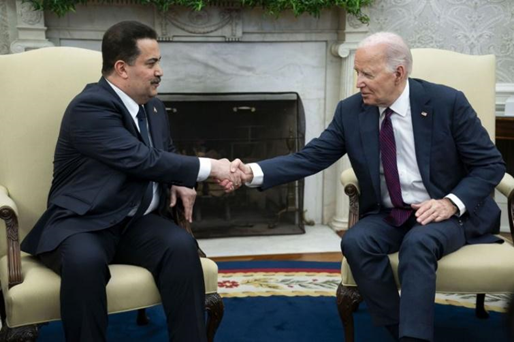Iraqi Prime Minister Mohammed Shia Al-Sudani led a charm offensive on his recent visit to the US, despite troubles at home and in the region. Meeting with US President Joe Biden and other senior Washington diplomats, he has taken back home with him significant investment pledges and a shared mutual understanding to evolve relations beyond just security.
The long-planned visit came during a time of growing instability in the Middle East not least following Iran’s recent military strike against Israel. The Iraqi leader described conversations as ‘positive’ and managed to carefully navigate the complex geopolitical tightrope while amplifying his Iraq-first messaging.
Al Sudani’s visit came at a pivotal time, not least due to recent events in the Middle East. For his part, the Prime Minister travelled to Washington to make calls for an orderly withdrawal of US-led coalition forces from Iraq and to also discuss pivoting of US/Iraq bilateral ties away from a predominantly security-focused relationship.
The visit was also used by Baghdad to ask Washington to do more to stop the war in Gaza, with the Prime Minister echoing previous calls from other Arab States. For his part, the Iraqi leader issued a call for restraint in the region and his desire to stop the expansion of the conflict area.
Speaking with both CNN and PBS, Al-Sudani did not shy away from complex questions relating to the security situation in the region especially when factoring in Baghdad’s close ties with Tehran. In this regard, he said the Iraqi government urges Iran to not escalate matters further and that Iraq categorically rejects the use of its airspace by any country, stressing he does not want the country ‘to be engaged in the area of conflict’.
A longstanding complex issue for Al-Sudani has been the continued presence of US-led global coalition forces stationed in Iraq, estimated to be around 2,500 troops in total. In January 2023, the Iraqi leader told the Wall Street Journal that he supported ‘indefinite’ US troop presence in the country before almost a year later telling the same publication that the coalition is ‘no longer needed’.
The events of October 7 and subsequent regional escalation have led Iraq being pulled into the conflict as armed groups retaliate against Israel’s actions.Recent events may have led Al-Sudani to change policy approach. He maintains that ISIS now is ‘no longer a threat to the safety and security’, (owing both to the work of the global coalition and the continued operations of Iraq’s own security forces) and emphasises that the coalition was formed upon Iraq’s request and must also end on the same terms.
The Prime Minister returns to Baghdad with an agreed framework and joint statement with President Biden in which both sides will continue working towards the withdrawal of US-led forces from the country in an orderly, non-disruptive manner. This builds on existing reforms being pursued nationally, particularly with regards to infrastructure investment and overall government support for Iraq’s population.
As Iraq’s reforms continue, so too does its population’s support for the government as demonstrated in recent Gallup polling data which illustrates a record amount of support for the government since Gallup polling began over a decade ago.
Both Al-Sudani and Biden favour shifting the relationship towards economic growth and foreign direct investment, but will continue their security partnership as part of their commitment to tackle ISIS.
For Al-Sudani, the visit marked a pivotal opportunity to pursue a deeper ‘360-degree strategic partnership’ designed to benefit Iraqis. Indeed, the country has been able to capitalise on a relative period of stability under Al Sudani’s leadership, undertaking long overdue infrastructure projects to build economic capacity. Many of these projects had stalled under previous governments which were mired in corruption. To this end, Iraq’s regional partners have, and will continue to play, a major role, in many cases supplying the capital required to achieve Baghdad’s ambitions.
From President Biden’s perspective, Iraq continues to be a major regional ally as well as Iran’s closest partner. The country’s newfound political stability – despite flare ups between armed groups in the country – demonstrates that Iraq’s democracy and government could be at its most resilient since 2003. Washington could no doubt continue to play a role in helping Iraq maximise its potential, something that Baghdad clearly appreciates.
Prime Minister Al-Sudani has returned to Iraq to show he is capable of holding his own on the world stage, bringing back with him a number of signed agreements with major US companies ranging from energy, pharmaceuticals, and defence agreements and deals.
Several Iraqi and US companies signed energy agreements during the visit to help Iraq boost its domestic energy capabilities in a move that further tackles decades of underinvestment and over reliance on Iran. Major US companies including KBR, Baker Hughes and GE have all signed memorandums of understanding to be involved in the projects which will help the country achieve energy self-sufficiency by 2030.
Other significant meetings were also facilitated to catalyse investment in Iraq, including one with JP Morgan’s Development Finance Institution and CEO Jamie Dimon who praised ongoing reforms in the country including those for state-owned and private banks.
While Al-Sudani’s first ever White House visit is complete, Iraq will need to continue to prove that it can maintain sustained economic growth and security in the country.
